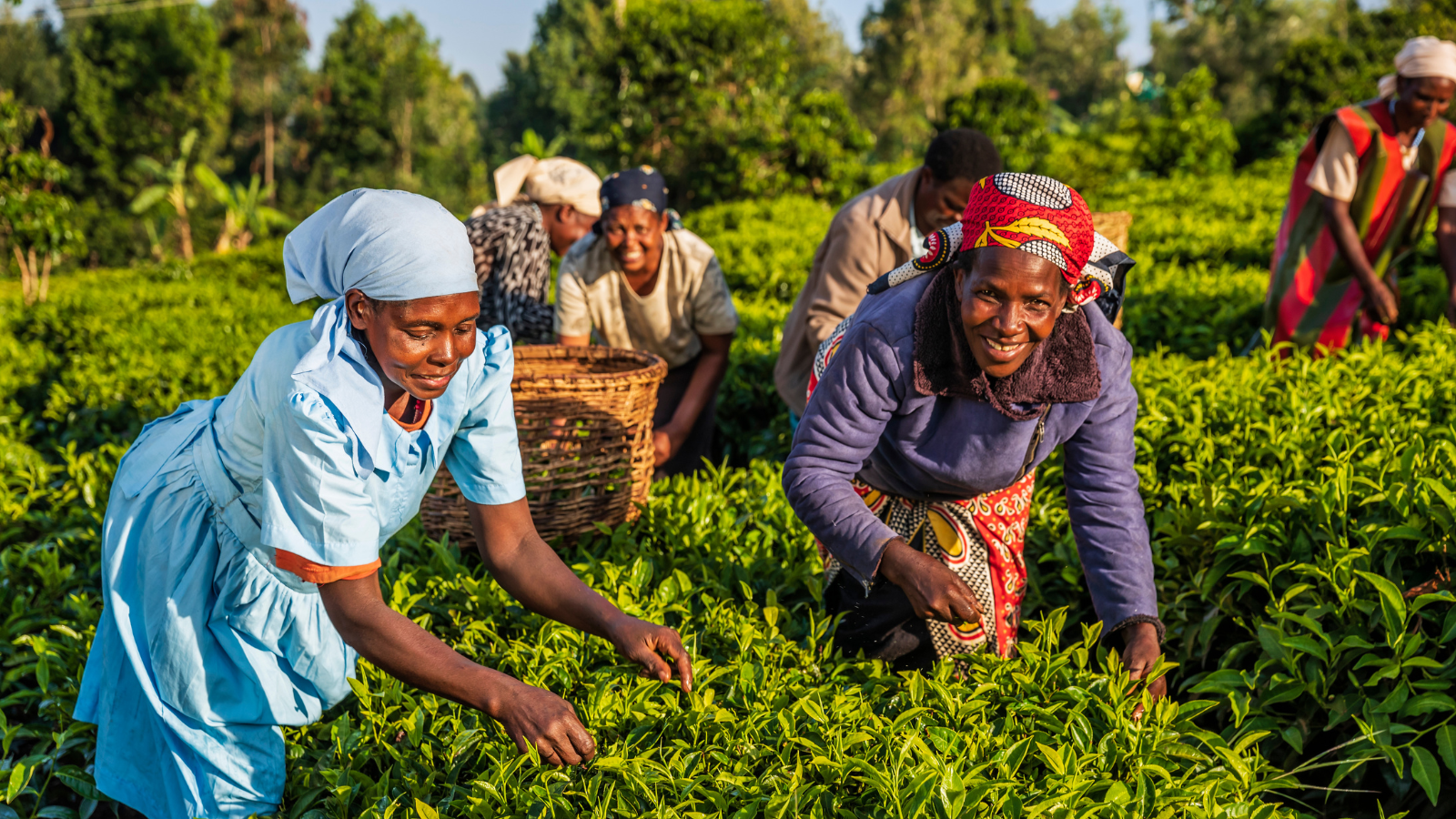
Women plucking tea leaves on a plantation in western Kenya.
Macroeconomic policies, as the cornerstone of global economic governance, have the power to shape nations’ socioeconomic landscapes. However, these policies often have unequal effects on different genders, particularly women and girls, in all their diversity. Over the years, we have witnessed the harsh reality of fiscal policy measures that disproportionately burden women and girls.
A stark example is Sri Lanka, currently grappling with an economic crisis due to an overwhelming debt burden of 103.8% of its Gross Domestic Product (GDP). As a result, the government – constrained, at least in part, by loan requirements set by the International Monetary Fund (IMF) – has resorted to stringent measures, including severe cuts in public spending, significant hikes in consumer taxes, and the introduction of labour legislation that threatens hard-earned progress regarding salary levels and job security, particularly for women.
Meanwhile, in Zambia, the public debt escalated by a staggering 6.4 billion U.S. dollars in 2023, marking a 33.42% surge compared to the previous year. Consequently, Zambia’s national debt peaked in 2023 at a daunting 25.5 billion U.S. dollars. This upward trend in the national debt has been a consistent feature in recent years, painting a grim economic picture. This has decreased funding for other important areas, such as education (which decreased from 17.2% in 2016 to 12.4% in 2022) and health, as more money is continuously allocated to debt repayment instead of funding public service delivery.
The Committee on the Elimination of All Forms of Discrimination Against Women (the CEDAW Committee) has highlighted the role of policymakers in using macroeconomic policies to advance gender equality and fulfil their human rights obligations under the CEDAW convention. This can be achieved through the implementation of temporary special measures, the practice of gender budgeting, or human rights-based approaches to raising and spending money on social, developmental, and reparative goals.
The CEDAW Committee actively monitors country compliance with CEDAW obligations in relation to their macroeconomic policies. If these policies do not align with CEDAW standards, the Committee will provide guidance on measures that can be taken to align macroeconomic policy with the Convention and protect women’s socioeconomic rights.
NGOs have a crucial function in providing the Committee with data and evidence regarding the effects of macroeconomic policies on women’s human rights in their respective countries, as well as influencing the recommendations issued by the Committee. The CEDAW Shadow Report Guideline on Gender Equality and Macroeconomics (GEM) by IWRAW AP offers valuable insights into the process of NGOs submitting shadow reports on the topic of gender and macroeconomics.
Article 13 of CEDAW mandates promoting gender equality across all economic areas of life, complementing Articles 10 on education, 11 on employment, and 12 on health, among others. These should be interpreted alongside Article 2(1) of the International Covenant on Economic, Social and Cultural Rights (ICESCR), which emphasises that countries should provide the ‘maximum available resources’ to achieve economic, social, and cultural rights in line with the principles of international human rights law. The Committee has also begun to closely monitor the government’s implementation of macroeconomic policies as part of their core obligations under Articles 2 and 3, which define discrimination and set out the measures States will take to eliminate it and advance gender equality, and Article 4, on temporary special measures aimed at accelerating de facto gender equality. For instance, the distribution of funds is a political choice that frequently mirrors the interests of powerful actors within a country, such as wealthy elites and corporations. Gender biases in budget allocation have led to insufficient financing for domains that primarily affect women or are essential for women’s health, education, social protection structures and labour force engagement. A gender-responsive budget guarantees that women’s specific demands and contributions are appropriately and sufficiently considered.
Some key socioeconomic queries by the Committee during the 88th CEDAW session centred around women’s access to socioeconomic opportunities. Specifically, the Committee enquired about efforts by governments to address hurdles that hinder access for women from rural regions in Estonia, LGBTQI individuals in Brazil, and women with disabilities in Rwanda. The Committee also questioned the implementation of social protection measures to improve the welfare of women, including the establishment of care facilities for both childcare and elderly care, as well as the allocation of resources for centres catering to women who have been victims of trafficking and/or other forms of abuse. Another important line of inquiry was on the gender pay gap, labour and employment regulations that apply to both formal and informal workers in relation to benefits such as implementation of pension schemes and maternity leave for all in national labour laws in Korea and other reporting states. There was also an emphasis on migrant domestic workers, with the Committee asking states about their access to legal remedies and resources, medical care, and in Kuwait, their freedom to change employers.
The Committee extensively queried countries’ temporary special measures (TSMs) or lack thereof in addressing socioeconomic problems, particularly in the emerging fields of AI and digital economies, to achieve gender parity and increased participation. Furthermore, the committee inquired about the private sector’s investment in fundamental economic sectors and how non-state actors adhere to the CEDAW principles and standards to guarantee that investments promote Agenda 2030 and Sustainable Development Goal 5 on Gender Equality.
Women’s socioeconomic rights are closely connected to land rights, as these liberties significantly and positively affect women’s financial autonomy, employment opportunities, and entrepreneurship. However, less than 20% of landowners worldwide are women (USAID). Recognising the significant role of agriculture in national economies and food security, the Committee examined the measures being taken by states to address the challenges faced by women in this sector, including limited access to WASH amenities, inadequate childcare facilities, and discriminatory laws pertaining to land ownership and inheritance of property.
These are a few macroeconomic concerns currently being observed in the CEDAW sessions, which will likely persist as countries update their endeavours to advance gender equality. The Global South is currently facing a growing debt crisis with a disproportionate impact on women and girls. Incorporating CEDAW principles into macroeconomic policy is a legal and moral obligation and an economic necessity that will lead to substantive equality for women in all their diversity.
Without a doubt, gender equality can stimulate economic expansion, enhance social results, and promote long-term, sustainable progress. However, this should not be the sole justification for gender-responsive/transformational macroeconomic policy. The CEDAW process provides an opportunity to address and promote structural and justice-oriented changes in macroeconomic policy making. This can contribute to the feminist demands for tax justice, debt justice, a fair and inclusive care economy, climate reparations, and other related issues. This will aid in dismantling the current financial architecture, and establish a new one – one which is grounded in the principles of women’s human rights and equality for all, resulting in a more equitable and prosperous society.
Nicole Maloba is a lawyer and policy researcher dedicated to closing the gap between localised efforts to promote women’s socioeconomic rights and broader endeavours to reshape economies through legislative gender reform and feminist macroeconomics analysis. She currently coordinates the CEDAW and Macroeconomics working group at IWRAW AP.

